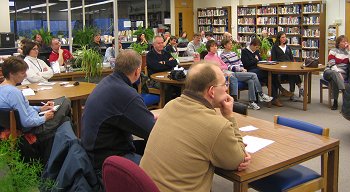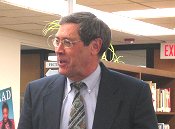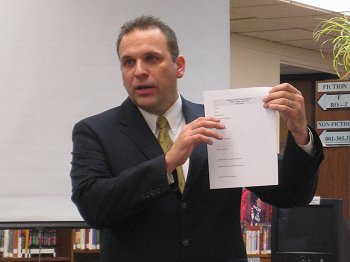- By Dan Veaner
- News
 Print
Print
"It's a very, very stressful process, and an emotional process that we have to go through with out budget," Lansing Superintendent of Schools Steve Grimm began. "What we have to do is make up for about one and a half percent of this year's budget, because we are currently going to overspend by about $262,000. That's about 1.5% of the budget. Most districts might say the consumer price index is a little over 3%. We've got that 1.5% on top of that 3%. That would be somewhere near 5%. We can't do 5% budget to budget."
That was the message at a town meeting Grimm hosted at Lansing High School last night. Nearly 40 community members, teachers, and school officials gathered to learn what impact next year's budget will have on taxpayers, and what impact it will have on the district itself. The meeting is part of an open process Grimm instituted to get the most information from all the stakeholders about how cuts will impact the district.

Grimm welcomed the group, then turned the meeting over to Interim Business Administrator David Klemm to explain what the numbers look like at this point. Klemm was hired to fill in after Larry Lawrence left the position last August, and was to have stayed until a new permanent business manager was hired in January. When the one qualified candidate passed on the job Klemm agreed to stay until April 15, at which time the district will have to hire another Interim Business Manager. But during his short tenure Klemm has garnered the respect of colleagues and community members for his straight talk about school district finances.
 Klemm went over the figures that he presented to the school board last week. At that time he started with a rollover budget that assumes nothing changes from this year to next. He calculated that he would have to cut $351,151 from that figure to make next year's budget 7% more than this year's. To get down to 5% he calculated a $793,037 cut. But that is just the budget cut. A 7% budget would have a 10.16% impact on the tax levy, and a 5% budget would mean a nearly 7% rise.
Klemm went over the figures that he presented to the school board last week. At that time he started with a rollover budget that assumes nothing changes from this year to next. He calculated that he would have to cut $351,151 from that figure to make next year's budget 7% more than this year's. To get down to 5% he calculated a $793,037 cut. But that is just the budget cut. A 7% budget would have a 10.16% impact on the tax levy, and a 5% budget would mean a nearly 7% rise.
Klemm said the ultimate goal is to cut further to between 3% and 4%. And that will mean cuts of more than a million dollars. He said that includes the 1.5% of overspending from this year. And while cuts of that magnitude will be painful to the school district, the taxes will still be painful to property owners within the district. Klemm noted that a third of Lansing taxpayers will see a significant rise in their tax rate, meaning they will pay more of the school tax this summer. One third will see a lower assessment, but that is poor consolation for those who will have to pay more.
Grimm and Klemm explained that budget reserves have been spent out in order to make past years' tax levies lower. But that means that if a boiler blows out or some other unexpected large expense arises, the district will not have the money to pay for it.
When the floor was opened for questions John Schabowski asked whether the district will receive the same amount of state aid this year as last. Klemm said it would get slightly more this year, but expressed four concerns about future years, including one-shot aid that may not be repeated, the high cost of special needs students that are not necessarily funded by the state, BOCES aid uncertainty, and the downturn in the economy in general.
Resident and teacher Dan Ferguson asked what is being done to prevent $250,000 overspending in future budgets. Klemm explained that he is budgeting conservatively. He is overbudgeting expenditures and underbudgeting income to try to create a safety net in the face of rising fuel and other costs. He said he has also shown his numbers to an independent auditor and two community members to get their input on his numbers, and that they responded favorably.
But Klemm noted that he can't predict the future. "I feel confident, but I can't look into a crystal ball," he said. "I will try my best to protect the program for kids as long as the program is necessary."

Superintendent Steve Grimm
Other questioners asked about the availability of the information on the Internet, the impact to homeowners of an assessment reduction on the power company at Milliken Station and how spending will be monitored to control future overages.
Grimm was complimentary of his administrative staff, including the school principals, as well as teachers and the union. He stressed two way communication even to the point of cluing in union officials on the day of a school board meeting so they will not be surprised by issues raised there. He noted that over 70 questionaires have been turned in detailing the impact cuts to various programs will have on the district, the programs, and kids.
"We're not looking at a number saying, 'how much can we get out of them?'," Grimm explained. "We're really analyzing our program to say what do we need to deliver our high quality program? We're trying to figure out how to pare that down so it's reasonable and appropriate for the community. We're not just ballparking a number. We're way beyond that. When you have to cut over a million dollars, when a teacher is about $50,000 -- that's a lot. We're very lucky that we've got 6 retirements. We are in deep cuts already."
But it was Ferguson that asked the question that is on everyone's minds. "Just to be very clear, the 100% rollover is off the table?" he asked, meaning that teacher positions may be cut. "I'm not sure how well understood that is in the community."
"It might not be people," Grimm said. "We don't know how it will shake out so far, because if we cut three positions but six people retire, we're actually hiring three more people. So we're not thinking about people yet, but that's going to be the next phase. We're hoping that through attrition we won't have to let any people go. But I don't think that's going to be possible. We'll see as the weeks unfold."
----
v4i11
That was the message at a town meeting Grimm hosted at Lansing High School last night. Nearly 40 community members, teachers, and school officials gathered to learn what impact next year's budget will have on taxpayers, and what impact it will have on the district itself. The meeting is part of an open process Grimm instituted to get the most information from all the stakeholders about how cuts will impact the district.

Grimm welcomed the group, then turned the meeting over to Interim Business Administrator David Klemm to explain what the numbers look like at this point. Klemm was hired to fill in after Larry Lawrence left the position last August, and was to have stayed until a new permanent business manager was hired in January. When the one qualified candidate passed on the job Klemm agreed to stay until April 15, at which time the district will have to hire another Interim Business Manager. But during his short tenure Klemm has garnered the respect of colleagues and community members for his straight talk about school district finances.

David Klemm
Klemm said the ultimate goal is to cut further to between 3% and 4%. And that will mean cuts of more than a million dollars. He said that includes the 1.5% of overspending from this year. And while cuts of that magnitude will be painful to the school district, the taxes will still be painful to property owners within the district. Klemm noted that a third of Lansing taxpayers will see a significant rise in their tax rate, meaning they will pay more of the school tax this summer. One third will see a lower assessment, but that is poor consolation for those who will have to pay more.
Grimm and Klemm explained that budget reserves have been spent out in order to make past years' tax levies lower. But that means that if a boiler blows out or some other unexpected large expense arises, the district will not have the money to pay for it.
When the floor was opened for questions John Schabowski asked whether the district will receive the same amount of state aid this year as last. Klemm said it would get slightly more this year, but expressed four concerns about future years, including one-shot aid that may not be repeated, the high cost of special needs students that are not necessarily funded by the state, BOCES aid uncertainty, and the downturn in the economy in general.
Resident and teacher Dan Ferguson asked what is being done to prevent $250,000 overspending in future budgets. Klemm explained that he is budgeting conservatively. He is overbudgeting expenditures and underbudgeting income to try to create a safety net in the face of rising fuel and other costs. He said he has also shown his numbers to an independent auditor and two community members to get their input on his numbers, and that they responded favorably.
But Klemm noted that he can't predict the future. "I feel confident, but I can't look into a crystal ball," he said. "I will try my best to protect the program for kids as long as the program is necessary."

Superintendent Steve Grimm
Other questioners asked about the availability of the information on the Internet, the impact to homeowners of an assessment reduction on the power company at Milliken Station and how spending will be monitored to control future overages.
Grimm was complimentary of his administrative staff, including the school principals, as well as teachers and the union. He stressed two way communication even to the point of cluing in union officials on the day of a school board meeting so they will not be surprised by issues raised there. He noted that over 70 questionaires have been turned in detailing the impact cuts to various programs will have on the district, the programs, and kids.
"We're not looking at a number saying, 'how much can we get out of them?'," Grimm explained. "We're really analyzing our program to say what do we need to deliver our high quality program? We're trying to figure out how to pare that down so it's reasonable and appropriate for the community. We're not just ballparking a number. We're way beyond that. When you have to cut over a million dollars, when a teacher is about $50,000 -- that's a lot. We're very lucky that we've got 6 retirements. We are in deep cuts already."
But it was Ferguson that asked the question that is on everyone's minds. "Just to be very clear, the 100% rollover is off the table?" he asked, meaning that teacher positions may be cut. "I'm not sure how well understood that is in the community."
"It might not be people," Grimm said. "We don't know how it will shake out so far, because if we cut three positions but six people retire, we're actually hiring three more people. So we're not thinking about people yet, but that's going to be the next phase. We're hoping that through attrition we won't have to let any people go. But I don't think that's going to be possible. We'll see as the weeks unfold."
----
v4i11



